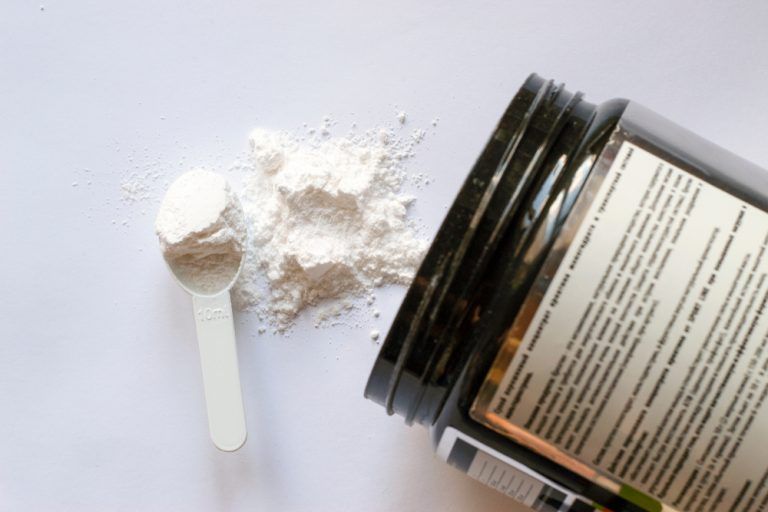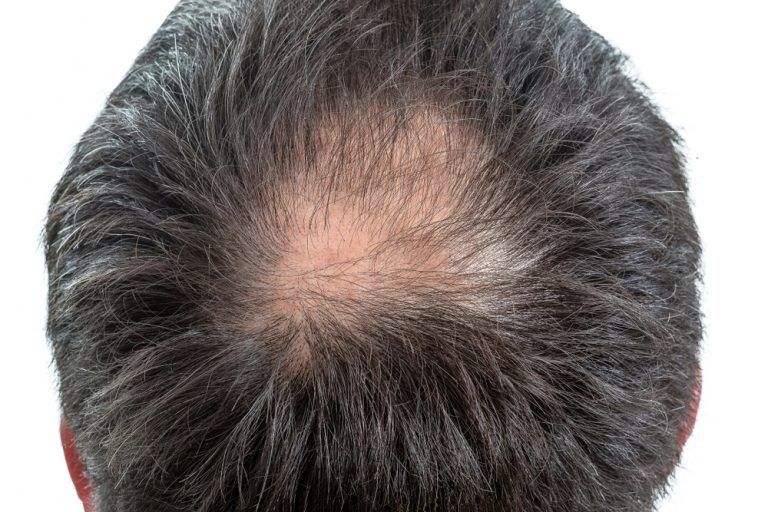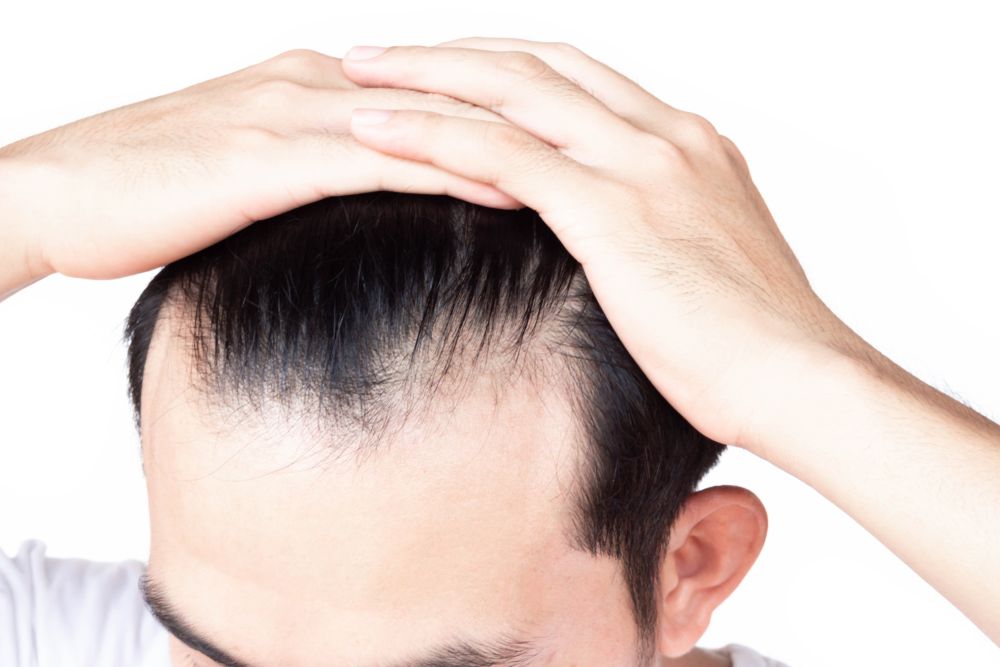Creatine & Hair Loss: The Science in 2022
Many men who work out and want greater muscle definition take creatine supplements. They experience great improvements in muscle weight and tone, but they may worry about hair loss associated with the substance. (Learn More) Creatine changes testosterone into dihydrotestosterone (DHT), a chemical associated with many secondary sex characteristics in men like muscle tone. It is also involved in some changes during puberty. (Learn More) DHT can change hair texture as a man ages. The more DHT in the body, the more likely a man is to lose his hair. (Learn More) The link between creatine and hair loss is mostly anecdotal. There is little scientific evidence showing they are related at all. If you want to take these supplements, you probably do not have to worry about losing your hair. (Learn More)
Can Creatine Cause Hair Loss?

Workout supplements are popular methods to enhance physical performance and improve muscle tone. Creatine is one of the most popular supplements, although it is quite controversial due to some reported side effects. This chemical is an amino acid that naturally occurs in muscles and the brain. The kidneys, liver, and pancreas make creatine, and the amino acid is found in foods like red meat and seafood. Creatine is also made synthetically in some cases, particularly for workout supplements. Creatine is recommended to reduce skin aging and manage creatine-metabolizing syndromes in children who cannot digest this chemical from foods. It has sometimes been recommended to reduce the risk of heart failure, but this over-the-counter use for the supplement has little medical research or evidence to back it up. The leading reason people take creatine supplements is to improve muscle growth from working out. These supplements are generally considered safe, but many people report that creatine can increase the risk of hair loss. For men who want to improve the effects of their workouts, this can be a disappointing and embarrassing side effect.
How Does Creatine Affect the Body & Hair?
Creatine changes cellular processes that lead to increased muscle mass, strength, and improved recovery times. There is some evidence that it can improve mental function. There may be many benefits, but men who take creatine workout supplements may find that they encourage hair loss. One of the first scientific studies investigating creatine’s impact on muscles, hormone levels, and hair loss was published in 2009 in the Clinical Journal of Sports Medicine. There were 20 college-aged rugby players who volunteered for the trial. Participants were loaded either with a creatine supplement or a placebo for 7 days, followed by 14 days of maintenance on the substance. Researchers took body composition measurements at several points to determine how effective the supplements were at bulking up muscle. One of the chemicals found to increase the body’s conversion of testosterone to dihydrotestosterone (DHT). DHT does improve muscle tone and growth, but it has also been associated with hair loss. In participants, serum testosterone levels did not change with the creatine supplement ingestion; however, DHT increased 56 percent during the first week of creatine-loading, and it remained 40 percent higher than the original baseline in the following two weeks. For some men, any increase in DHT can amplify the risk of hair loss in the form of male pattern baldness (MPB).

Male Pattern Baldness, DHT & Creatine
Some studies have found that creatine increases DHT, a testosterone-produced chemical that is associated with hair loss from androgenic alopecia, or male pattern baldness (MPB). This condition affects about 50 million men in the United States. DHT is also involved in:
Deepening voices in men.
Increased body mass and body hair.
Growth of the penis, scrotum, and testicles as sperm production begins around puberty.
Changes in how fat is stored around the body.
On average, about 10 percent of testosterone in men’s bodies is converted to DHT. With a supplement like creatine, this could be much more. While there are few truly harmful side effects for men experiencing this process, and many potential health benefits that need more medical study, increased DHT could potentially trigger or increase embarrassing MPB. When there is extra DHT in the body, it can shrink hair follicles and shorten the hair growth cycle. New hair may be thinner, lighter, and more delicate, so it may fall out faster. It will take longer for follicles to begin growing new hair after old hairs fall out.
The Science Behind Creatine & Hair Loss
The University of Maryland has studied creatine supplements and not found any significant concern with side effects if the chemical is taken for six months or less. The risk of side effects increases greatly after six months of regular consumption, however, and this includes the increased risk of hair loss. Each person’s genetics and body chemistry are different. If you have a family history of MPB or other causes of hair loss, creatine supplements may not be for you. There are few scientific studies confirming that creatine causes hair loss. It is unlikely to cause hair loss in all men, and it possible that it may not impact you even if you have a family history of thinning hairlines or MPB. Most of the information about creatine and hair loss is anecdotal, which indicates that some people may experience the correlation of these two things. Creatine does not cause hair loss. It can be a beneficial supplement for men who want more muscle through harder workouts, and it is a safe supplement to take for six months or less regardless of hair loss history. If you want to take creatine and are concerned about losing your hair, speak with a dermatologist for more information.
References
Creatine 101 – What Is It and What Does It Do? (October 25, 2018). Healthline.
Creatine: Overview. (October 12, 2017). Mayo Clinic.
Three Weeks of Creatine Monohydrate Supplementation Affects Dihydrotestosterone to Testosterone Ratio in College-Aged Rugby Players. (September 2009). Clinical Journal of Sports Medicine.
What You Need to Know About DHT and Hair Loss. (January 10, 2019). Healthline.
Creatine Monohydrate and Hair Loss. LIVESTRONG.

Related Articles

10 Popular Statin Medications - Comparison, Side Effects & How They Work
Statins are among the most commonly prescribed...

Pregabalin vs Gabapentin - Comparison Guide & Similarities
Pregabalin vs Gabapentin, are both classified as...

Zepbound vs Mounjaro Comparison Guide: Similarities, Side Effects & More
Zepbound vs Mounjaro Comparison Guide...

Aleve vs Advil - What's The Difference? Comparing These NSAIDs
SaveHealth a prescription website compares Aleve vs Advil...
